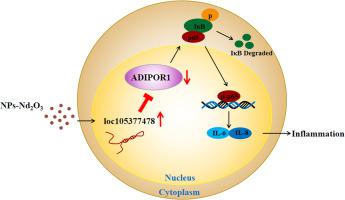Ecotoxicology and Environmental Safety ( IF 6.8 ) Pub Date : 2020-11-12 , DOI: 10.1016/j.ecoenv.2020.111609 Feng Yu , Xia Zhang , Lei Gao , Hainan Xue , Ling Liu , Suhua Wang , Shijie Chen , Lihua Huang

|
With the wide application of neodymium oxide nanoparticles (NPs-Nd2O3) in various fields, their health hazards have aroused public concern in recent years. However, data regarding the cytotoxicity of NPs-Nd2O3 is limited. In this study, we investigated the function and mechanism of long-chain non-coding RNAs (lncRNAs) in NPs-Nd2O3-induced airway inflammation. Treatment with NPs-Nd2O3 induced an inflammatory response in human bronchial epithelial cells (16HBE) by upregulating the expression of interleukin-6 (IL-6) and interleukin-8 (IL-8). The levels of LDH and intracellular ROS in the cells treated by various doses of NPs-Nd2O3 also increased significantly. After treatment with 10 μg/ml NPs-Nd2O3, RNA microarray and real-time quantitative polymerase chain reaction (qRT-PCR) showed a significant upregulation of lncRNA loc105377478. Functional experiments suggested lncRNA loc105377478 enhanced the expression of IL-6, IL-8 and ROS in NPs-Nd2O3-treated 16HBE cells, and it was further demonstrated that lncRNA loc105377478 promoted the activation of NF-κB by negatively regulating ADIPOR1 expression. Moreover, the expression of IL-6 and IL-8 in NPs-Nd2O3-treated 16HBE cells was regulated by lncRNA loc105377478, which was mediated by the NF-κB signaling pathway. In conclusion, lncRNA loc105377478 promotes NF-κB activation by negatively regulating ADIPOR1 expression, thereby upregulating the expression of IL-6 and IL-8 in 16HBE cells treated with NPs-Nd2O3.
中文翻译:

LncRNA loc105377478通过ADIPOR1 /NF-κB轴促进NPs-Nd 2 O 3诱导的人支气管上皮细胞炎症
随着氧化钕纳米颗粒(NPs-Nd 2 O 3)在各个领域的广泛应用,近年来它们的健康危害引起了公众的关注。但是,关于NPs-Nd 2 O 3的细胞毒性的数据是有限的。在这项研究中,我们调查了NPs-Nd 2 O 3诱导的气道炎症中长链非编码RNA(lncRNA)的功能和机制。NPs-Nd 2 O 3处理通过上调白介素6(IL-6)和白介素8(IL-8)的表达在人支气管上皮细胞(16HBE)中引起炎症反应。不同剂量NPs-Nd处理的细胞中LDH和细胞内ROS的水平2 O 3也显着增加。用10μg/ ml NPs-Nd 2 O 3处理后,RNA微阵列和实时定量聚合酶链反应(qRT-PCR)显示lncRNA loc105377478明显上调。功能实验表明lncRNA loc105377478增强了NPs-Nd 2 O 3处理的16HBE细胞中IL-6,IL-8和ROS的表达,并且进一步证明lncRNA loc105377478通过负调节ADIPOR1的表达促进了NF-κB的激活。 。此外,NPs-Nd 2 O 3中IL-6和IL-8的表达NF-κB信号通路介导的lncRNA loc105377478调控转染的16HBE细胞。总之,lncRNA loc105377478通过负调节ADIPOR1的表达来促进NF-κB的活化,从而上调NPs-Nd 2 O 3处理的16HBE细胞中IL-6和IL-8的表达。


























 京公网安备 11010802027423号
京公网安备 11010802027423号